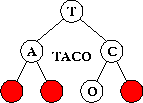TACO - Topologies And COllections

TACO (Topologies and Collections) is a highly efficient distributed object platform for cluster architectures which is entirely based on C++ templates.
TACO (Topologies and Collections) is a highly efficient distributed object platform for cluster architectures which is entirely based on C++ templates. TACO provides both template based remote method invocation mechanisms as well as powerful object groups as the basic means for high-level data-parallel programming. Entire distributed objects groups can be created, destroyed, selectively cloned and manipulated by various parallel collective operations. Thus programmers can treat entire object groups similarly to single objects. Consequently, complex replication and consistency problems can be solved with reasonable programming effort.
Object groups are based on dynamic distributed data structures where group membership is determined through reachability from a root node that represents the entire group. The group's topology is described by means of reusable topology classes. All collective operations are generically implemented following a parallel visitor pattern.
The first versions of TACO have originally been developed during the Real World Computing Project in Japan. TACO can be downloaded as part of the SCore cluster computing software distributed by the PC-Cluster Consortium. Since then, TACO went through several steps of reorganisation and improvement. Currently, TACO is continiously evolving further and serves as a basis for several projects conducted by the group for distributed systems and operating systems including research an Distributed Coordination Spaces, Content Addressable Networks and Distributed Shared Memory for Cluster- and Grid Environments.
doxygen-based source documentation
A Tutorial Introduction to TACO
News about TACO development
Publications
These contents are currently under construction. A complete list of all publications can be found in the publication area.
